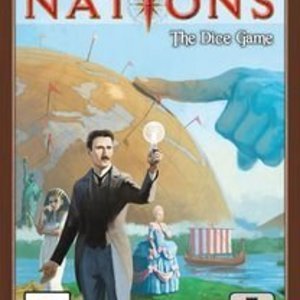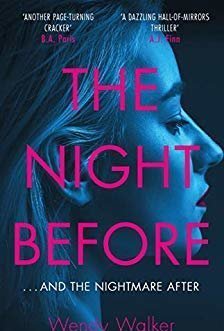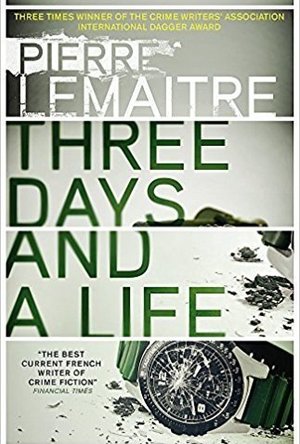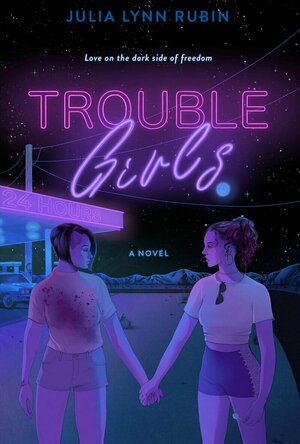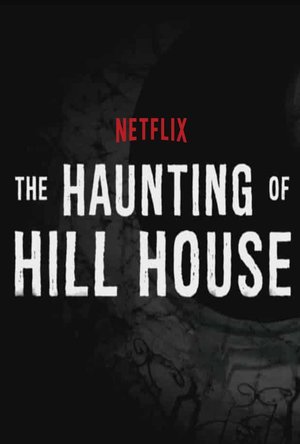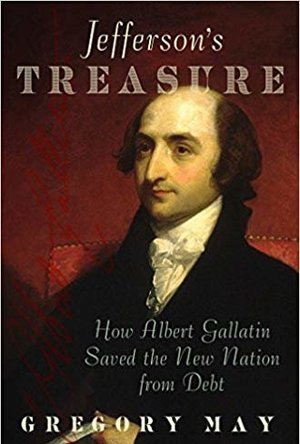Purple Phoenix Games (2266 KP) rated Nations: The Dice Game in Tabletop Games
Aug 16, 2019 (Updated Jul 17, 2021)
Nations: The Dice Game (can I please just call it Nations for this review as we know I am not talking about the original? Thanks.) is a civilization building, upgrade tile drafting, dice game for one to four players. Players will be upgrading their civilizations over four game rounds to compete for Books and VPs. The player with the most VP at the end of the game is the winner.
Disclaimer: The photos shown here is for a solo game, as I took them during my learning game using the solo rules. Normally the purple d4 is not used in multiplayer games. -T
To setup, each player will choose a starter civilization mat, receive five white dice, a gold chit, and a re-roll chit. Player order will be determined by cards and each player will receive their player order card which doubles as a reference card (great idea). The Progress Board will be set on the table and populated with randomized Age I Progress tiles according to the rule book. The Score Board will also be placed on the table to track Books, Events, and final VPs. The game begins with each player rolling their five dice.
Nations (TDG) is played over four ages with multiple rounds per age. At the beginning of each age old tiles will be removed from the Progress Board and new ones for the current age added. Also an Event tile will be drawn and placed on the Score Board to signify goals for Famine and War at the end of the age. On a player’s turn they will take one action from the following: Re-Roll (any or all unused dice by spending a re-roll chit), Buy tile (from the Progress Board to upgrade player mat spaces and dice), or Build Wonder (tile using Stone dice or chits for VP). When a player has taken as many turns/actions they wish for the age, they turn their player order card to the side to indicate they have passed for the remainder of the age.
Once all players have passed, they will tally their unused dice and any chits showing Books to be recorded on the Book track. Players will score points for Books based on how many opponents they have outscored for Books. Then players will consult the face-up Event tile that was revealed at the beginning of the round. The top portion displays VP earned when players discard unused dice and chits showing Famine leaf icons matching or exceeding what is on the Event tile. Similarly, for War players will consult the Event tile and use the sword icons on unused dice and chits to score any VPs for War. Play continues in this way across all four ages and once the fourth age has been scored the game ends and winner named victorious!
Components. I have mostly good news here. The dice in this dice game are wonderful. They are all easy to read and understand, and feel great when rolling nine or ten of them at once. The chits are fine, the Progress and Event tiles are nice and thick. The player mats, Score Board, and Progress Board are very thin though. I was going to give that a negative remark, but you know, players don’t really handle them during the game so there is no real need for them to be any thicker. The art is similar as in Nations, and while it does not resonate with me, it is fine. I won’t be playing Nations for the art.
All in all the game is fine. It didn’t blow me away or completely replace Nations (the big game) for me. It IS a pretty quick game to play, so there is one definite improvement over the big brother game; 10-15 minutes per player is pretty spot on. I usually do not prefer dice games to the originals (BANG! The Dice Game being the obvious improvement), and this one is really just on par with the big game. While it takes up less space on the shelf, I wouldn’t necessarily recommend it over its sibling. I feel the same way about each game, so my recommendation is get the version you feel would be played more often. Purple Phoenix Games gives Nations: The Dice Game a Montezuma-should-be-in-Age-IV 6 / 12. Give it a shot if you are into dice games, but grab the original if you want something meatier.
Kristy H (1252 KP) rated The Night Before in Books
Jun 21, 2019
So this wasn't exactly what I was expecting, and I have to admit, it was a slightly strange and weird--almost trippy--read. The book alternates between Laura and Rosie's viewpoints, with Laura's leading up to and covering her blind date, while Rosie's cover the "after" period, when she searches for her sister. No matter what, I will emphasize that the book mainly held my interest, and while I didn't love it as much as many other reviewers, it was an interesting read, for sure. It's different, too, which is always fun and sometimes hard to find when it comes to thrillers. I just wasn't as "wowed" as I'd hoped, based on some of the reviews I'd read.
The premise here is that Laura has a horrible track record with men. And that she has a bit of a history with violence and unpredictability. The first part you will certainly get, as it's hammered over and over. And over. A bit too much for my taste. We get it. She has bad taste in men and makes poor choices. The second part--her unreliability and potential for violence--is a bit more intriguing. Instead of Rosie thinking that something might have happened to Laura, she almost fears Laura might have done something to her date. I liked this premise: it goes back to the fact that the book was different. A lot of this stemmed to Laura's past and a mysterious encounter with an old boyfriend, which was slowly revealed.
"It was in my hand. The weapon that killed him. But that night didn't change me. That night made me see what I've always been."
There are definitely some interesting twists in this one. Some, eh, while others were very unexpected. But, more in the far-fetched unexpected realm, versus whoa!, which led to a little bit of my letdown feeling. I wasn't particularly impressed with the big reveal of whodunnit and had no real attachment to any of the characters, including Laura, which was a bit disappointing.
Still, as I said, this one definitely held my interest, especially in the last 1/2 - 1/3 of the book. It's different and a little weird and dark. Some of the twists didn't really do it for me, but there are a ton of people who really liked this one, so take my review with a grain of salt. I'm still glad I read this book, and I will definitely continue to seek out Wendy Walker's books, as they are always a fun read. 3+ stars.
Zuky the BookBum (15 KP) rated Three Days and a Life in Books
Mar 15, 2018
This book is very much about neighbourly relationships. It's based in the small village of Beauval where everyone knows everyone, there are friends in the village and there are enemies. They live everyday surrounded by people who know everything about them. There are a load of books about the small-town-mentality at the moment, it's clearly a very "in" thing for authors at the moment. Some of them I like, others I find boring or distressing. This one was just perfect for me!
We begin the novel in 1999 and this is where we get most of the small-town vibes. We meet Antoine and his mother, whose only worry is to keep up with appearances. We meet the neighbours, the Desmedt's and Mouchottes. We meet the town butcher, Monsieur Kowalski. We meet the Weiser's - the mayor and his son Theo. We meet a lot of different people, but they all have a very important role to play within the story.
It's the 23rd December 1999 and little Remi Desmedt has gone missing. There are plenty of the theories as to his disappearance, but we know what's happened to him, and we know where he is. What follows is a slow paced novel about the effects of Remi's disappearance on the town and the theories and judgments each villager makes on anyone suspected of having taken the young boy.
The majority of this novel is set in the few days after Remi's disappearance in 1999. This was definitely my favourite part of the novel. It was enjoyable to follow the story through Antoine's mind-set, who is 12 at the time. But as we move through the story, we meet Antoine again in 2011 and then again in 2015, but these parts of the book aren't as enjoyable to read.
As we progress through the novel, Antoine keeps coming up against challenges he needs to overcome. Will he do the right thing, or will he do anything to keep his secrets close?
Like I said before, this novel is slow paced, but I quite like that in a books sometimes. This is advertised as a thriller but I wouldn't think of is like that, this feels more like a general fiction novel to be honest. This was also described as "suspenseful", but again, I'm going to disagree with that. See what I mean about not being able to describe my feelings on it? I'm at a loss for words on what I feel this books was like! What I can say is that I love Lemaitre's way of writing. It really sucked me into the story and for this reason, I'm definitely checking out his other stuff!
Something I also know is that I enjoyed this book, for the most part. If it hadn't been for the 2011 and 2015 chapters, and the direction they took, this could have been a 5 star read for me.
Kristy H (1252 KP) rated Trouble Girls in Books
Jun 3, 2021
The premise of this book sounded amazing -- a queer "Thelma & Louise." Unfortunately, it all fell apart for me. Rather than being a #MeToo rallying cry, this was a depressing and stressful read, featuring two teens who make a bunch of stupid and ill-fated decisions.
I definitely understand the overall idea for TROUBLE GIRLS and even why Trixie and Lux run, afraid that no one will believe their story. But the choices they make along the way--spending their money on junk, not trusting each other, stealing and lying... and everything else. It's maddening. They do not act like two smart girls on the run, but two idiots who do not believe in one another. Trixie's infatuation with Lux clouds everything, and Lux comes across as this adored princess with no real personality of her own.
We're (eventually) told a bit of Trixie's backstory, including why we have to read the word "hog" in what feels like every other darn sentence, but the character development here is severely lacking. Trixie has a sick mom and a dark secret. Lux... likes makeup and her camera? I think this story would have would worked so much more if we knew how and why these two teens ticked. Why, exactly, was Trixie so in love with Lux? How exactly did Lux feel back? There's a weird switch that turns at some point in the book, and it made no sense to me. If you're going to give me a queer story, give me queer characters who truly feel for one another and whose love is based in reality.
Trixie and Lux's story is supposed to have a #MeToo angle to it, and it does, in some ways, but this was not a #MeToo anthem to me. It's two girls running away, trying to figure out maps on the back roads, and making poor decisions as they flee what they've done. While, again, I understand why they run, the story I wanted to read was Trixie and Lux returning to Blue Bottle and fighting along side the Intersectional Feminist Union and the other women they supposedly "rally" with a few misplaced social media posts. It was these women and Judy, Trixie's co-worker back home, whose life I wanted to know about--I would have enjoyed that book much more!
Overall, this book can tug at your heart strings, but also frustrate you to no end. There was much to its overall premise, but most of it did not work for me. 2.5 stars (Trigger warning: sexual assault, rape)

Hopper - Watch & Book Flights
Travel and Reference
App
Save up to 40% on your next flight! Hopper predicts the future of airfare. Watch your next flight in...
Principles of Horticulture
C.R. Adams, M.P. Early and K.M. Bamford
Book
"Principles of Horticulture" is an excellent introduction to the study of all aspects of the...
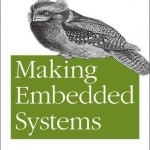
Making Embedded Systems: Design Patterns for Great Software
Book
Eager to develop embedded systems? These systems don't tolerate inefficiency, so you may need a more...
Fred (860 KP) rated The Haunting of Hill House in TV
Oct 24, 2018
I am not one to binge watch shows. My time is limited & I watch lots of stuff. But I was immediately hooked on this show. I watched half the season in one day & the rest the following.
The show does a very good job in taking the original movie's plot, changing things around & creating a terrifying tale that takes the psychological horror of the original, mixes it with some minor jump-scares & a compelling story of a family dealing with it's own demons as well as the spirits that live within Hell House. Yes, that was a very long sentence, which reminds me of the 6th episode, which is filled with long shots. The camera spins around, while things change around them. in fact, throughout the series, things change all the time. Sometimes statues turn their heads, ghosts appear in the background, faces appear in the furniture. Once I noticed one of these faces, just there, staring at the family. My fiance didn't even notice. I backed it up to show her. She went "Ooh! How did I not see that?"
The story does jump around in time, showing when the family first moved into the house, with 5 children & their parents & then in current day, still being haunted & compelled by the house. Every actor in the show is fantastic. Even the children really pull it off.
The ghosts in the show are creepy as all hell. My favorite is the tall man. I haven't been freaked out by a movie or TV show in decades, but I held my breath & stared as he...well, just watch.
I have recommended this to all my friends & those who watched it all got back to me to thank me. So, I'm recommending it to all of you too.
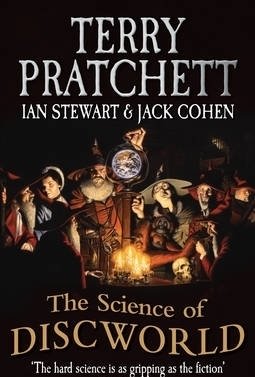
The Science of Discworld
Terry Pratchett, Ian Stewart and Jack Cohen
Book
This is the fantastic first book in the Sunday Times bestselling Science of Discworld series. When a...
Sassy Brit (97 KP) rated Jefferson's Treasure: How Albert Gallatin Saved the New Nation from Debt in Books
Jun 5, 2019
So who was this man that undid Alexander Hamilton’s fiscal system, rejecting it along with Madison and Jefferson? Because both Presidents did not understand the financial system, they depended on Gallatin to reform it. Gallatin arrived in America in 1790 from Geneva and rose up to become a trusted advisor of the Republicans. Six years before Jefferson was elected President, Gallatin’s Pennsylvania neighbors rebelled against the tax on whiskey. He supported them in principle but opposed the violence that ensued, burning the local tax collector’s house, robbing the mail, and marching on Pittsburgh.
The play “Hamilton” uses revisionist history. The real Hamilton believed in big government and wanted to continue funding federal deficits. He based his theories on the British who used the money to fund their large military conflicts, believing that the ability to borrow endless amounts of money would allow the new United States to become a great nation. Jefferson and Madison thought Hamilton’s system, straight from the British way, was tainted with tyranny. As May noted, “It made the people pay obnoxious taxes in order to fund interest payments on a mounting federal debt and the costs of an expensive military establishment. It shifted money from ordinary taxpayers to the relatively few rich men who held the government’s bonds. That was just the sort of thing that had led Americans to revolt against Britain in the first place.”
May believes, “The hip-hop immigrant hero of the Broadway musical is a myth. The musical might be a great work of art, but is relies on misconceptions of Hamilton. He was not an immigrant, but a migrant within the British Empire. Also, he was not a man of the people, as Gallatin was, but an elitist.”
While Hamilton committed to paying only the interest on the government’s debt, Gallatin committed the government to repaying fixed amounts of the principal each year. He also insisted that the government should never spend more than it earned except in times of war. By slashing federal expenses, Gallatin was able to get rid of the tax on whiskey and abolish the entire internal revenue service.
The Republicans, an agrarian society, distrusted these elitists where two-thirds of the government debt belonged to a few hundred very wealthy men residing mainly in Philadelphia, New York, and other mercantile cities. They saw Hamilton’s plan of collecting taxes from ordinary citizens as a way for a few rich men to become even wealthier. Implementing these excise taxes required government officials to inspect, quantify, and mark the items subject to tax.
The Hamilton system benefited the wealthy debt holders and spectators at the expense of the average taxpayer who had to pay the interest. The government would borrow more than the people could pay. Hamilton tried to hide how much money the government was actually spending and spiraled the debt higher and higher.
This was an important part of the British tax base, and “I wanted to show how unpopular it was. Hamilton and company were resented because they created a tax collection network that affected the lives of ordinary citizens. The excise tax is a form of internal taxation, while tariffs are a form of external taxation that fell on the well to do. Remember mostly the well to do bought imports. The Republicans once they came to power relied on import duties rather than excise taxes.”
May further explained, “When Jefferson and his administration came to power it was Gallatin who got rid of Hamilton’s deficit finance system and cut taxes. By the time he has left office he has repaid half the federal debt and set up a program for repaying the rest.”
Anyone who wants to understand the early economic systems of the Founding Fathers will enjoy this book. It shows how Gallatin, by killing Hamilton’s financial system, abolished internal revenue taxes in peacetime, slashed federal spending, and repaid half of the national debt.
